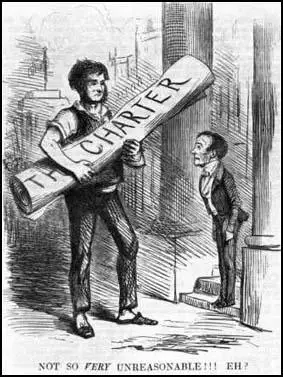Thomas Duncombe
Thomas Duncombe was born in Yorkshire in 1796. His father was a large landowner and a member of an aristocratic family that included the Earl of Carlisle and Baron Feversham. After his education at Harrow School Duncombe joined the Coldstream Guards.
While in the army Duncombe met General Ronald Ferguson, a soldier with radical political views. Thomas Duncombe was influenced by Ferguson's ideas and when he retired from the army in 1819 he began to look for a seat in the House of Commons. After two unsuccessful attempts, Duncombe was eventually elected to represent Hertford in June 1826.
In the House of Commons Duncombe became a strong supporter of parliamentary reform. However, as a result of the 1832 Reform Act, Duncombe lost his Hertford seat. Duncombe now joined Thomas Wakley at Finsbury. This was one of the largest constituencies in Britain and included Holban, Islington, Stoke Newington and Clerkenwell. Duncombe and Wakley shared similar political ideas and Richard Cobden once described them as "the kid-glove democrats and the unscientific radicals of the Finsbury School".
Thomas Duncombe was one of the few members of the House of Commons who was willing to argue the case for universal suffrage. Like Thomas Wakley and John Fielden, Duncombe made it clear that he considered it is responsibility to represent the views of the working people as well as those who had actually voted for him.
A close friend of William Lovett, Duncombe argued that the Chartists were not revolutionaries but reasonable men who deserved the vote. In April 1842 Duncombe agreed to present the Chartist petition signed by over 3 million people to Parliament. In his account of the debate that followed, Robert Gammage claimed that Duncombe's speech was "noble and manly, and elicited the warm esteem of men of all parties".

"Not so very unreasonable!!! Eh?"
Punch Magazine (April, 1848)
As well as using his influence in Parliament to promote the cause of Chartism, Duncombe also spoke at public meetings in favour of universal suffrage. Duncombe was a Moral Force Chartist and in 1848 he strongly opposed Feargus O'Connor when he began telling crowds that it might be necessary to use violence to obtain the vote.
Duncombe was very concerned about the power of the Post Office to open and read the mail of people with radical political beliefs. Duncombe, who had himself been a victim of this, persuaded the Home Secretary, Sir James Graham, to instigate an enquiry into the matter. Duncombe was unhappy with the report that Graham published and so he continued to argue for the Post Office to be reformed. It was largely because of the efforts of Duncombe that the reformer, Sir Rowland Hill, was appointed to run the Post Office in 1854.
Duncombe political life was hampered by ill-health. He was forced to spend long periods away from the House of Commons.
Thomas Duncombe died on 13th November, 1861.
Primary Sources
(1) R. G. Gammage, History of the Chartist Movement (1894)
A Convention was appointed to sit in London for three weeks, for the purpose of superintending its presentation. The body met in London on the 12th of April, 1842, and received the signatures to the National Petition, which in the aggregate were stated to amount to thirty-three thousand. The Petition was presented to the House of Commons by Mr. Duncombe on the 2nd of May, on which occasion there was a large procession.
Duncombe's speech was noble and manly, and elicited the warm esteem of men of all parties; but no amount of good speaking was sufficient to draw forth a response from the House of Commons, and only fifty-one members were found to vote in favour. The House was too cowardly, or too callously indifferent to the condition of the people, to consent to meet the representatives of the suffering poor face to face, and listen to the exposure of their wrongs from those who were best qualified to make it.
(2) William Lovett, Life and Struggles(1876)
I was brought up for judgment with my friend Collins, and both of us were sentenced to twelve months' imprisonment in the County Gaol. On the morning after my trial, when my little bucket of gruel was served out to me, I took up a black-beetle in about the first spoonful; this, together with the feverish state in which I was, caused me to take a loathing against this part of my prison fare. I therefore tried to satisfy my appetite for a few days with a little bread soaked in cold water for breakfast, and a morsel of bread and cheese for dinner. But this diet in a short time brought on a horrible diarrhea, under which, I believe, I should have speedily sunk had not my weakly appearance attracted the notice of William Collins, the member for Warwick, one of the visiting magistrates, on his going his rounds through the prison. Seeing me look so ill, he came up to me and questioned me about my health, and at once ordered me to be taken into the hospital. Mr. Thomas Duncombe very nobly brought my case before the House of Commons, together with that of other political offenders. To all of which the authorities turned a death ear, the only favour granted being a pint of tea instead of the prison gruel.
